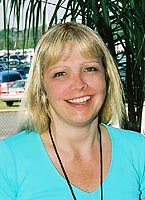|

3/9/04

THE ONLY BAD INK IS NO INK
Back in 2001 at Englishtown, N.J., Graham Light,
NHRA's senior vice-president of racing operations,
made me laugh. Maybe he didn't mean to, but
he did.
He had spent part of his race day discussing the merits of whether a legal brothel should be allowed to sponsor a nitro Funny Car. The madam -- or business owner, whichever you prefer -- had said she couldn't get an audience with Light. So I fixed that and brought them face-to-face on the porch of the tower. They had a calm, courteous discussion, after which Light decided not to entertain the thought of her putting her brothel's logo on the side of a car and the madam determined not to take that lying down.
Light later asked me, "Susan, why in the hell do you think I want a whorehouse sponsoring one of my race cars?" I corrected him, pointing out that none of these race cars belongs to him. Then I answered his question: I don't care.
I don't. My reason for bringing the woman to chat with him was simply to facilitate a dialogue. Rather than skirt the woman's efforts to discuss the issue, he should have welcomed the conversation as a springboard for refining NHRA's criteria for potential sponsors. She told him, "You have beer companies and tobacco companies sponsoring your racing. My product hasn't killed anybody." Maybe Nelson Rockefeller or Goldie Hawn's poor-slob newlywed husband in "Private Benjamin" aside, she had a salient point. And I have nothing against breweries or tobacco companies advertising. I don't smoke or drink, but beer and tobacco advertising certainly don't offend me at the race track. Beer and tobacco are legal products. So is what she sells -- in her county in Nevada. Light's arguments were that prostitution is not something NHRA wants to promote and that it is illegal in every venue the Powerade Drag Racing Series operates.
This isn't about the merits of brothel sponsorship.
What made me laugh was his comment to me as I was leaving Old Bridge Township Raceway Park. "Hey," he called out to me, "why is it that every time you show up at a race, something weird happens?"
Most of the time, the weird stuff would crop up even if I were home baking cookies in Snohomish, Wash. And let me state again my attitude about stirring the pot: I like the odd fight, but I don't like to waste my time on an unworthy opponent. So in general, no one would find me itching to start or uncover some controversy. If it presents itself, any reporter worth anything would pursue it. Anybody acting honorably or at least in good faith shouldn't worry about such matters.
I shared my insight into the not-all-that-secretive world of journalism with Light that day, and it's something perhaps that bears repeating for NHRA executives.
NHRA executives and I certainly are on the same side when it comes to our desire to see more NHRA coverage in local newspapers. Most sports editors focus on stick-and-ball-sports and ignore motorsports. A sports editor who enjoys auto racing and recognizes its economic impact on a community is a rare find. And NHRA has to be commended for its willingness to travel to a city to visit with a sports editor in hopes of trying to nudge him or her toward open-mindedness.
Because editors don't understand how many millions of motorsports fans exist worldwide and how many thousands would read their newspapers more with increased motorsports coverage, we have a problem. On the positive side, it is what inspired me to ask for and receive from the sports editor of the Chicago Tribune the chance to cover the NHRA races at Joliet, Ill. However, it's also what made me decide to quit The Seattle Times as motorsports (and hockey) writer for the past eight years. After eight years, if I couldn't budge them off dead-center, it was time to pour my energies into more productive projects.

|